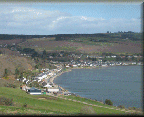Andrew de Moray was a member of the Anglo-Norman de Moravias (de Moray) family. His family held the Castle of Avoch (Ormond Castle) and were supporters of the Scottish cause in the wars against Edward I of England.
After the defeat of the Scots at the Battle of Dunbar in 1296, Andrew and his father were taken prisoner. Andrew escaped in the Spring of 1297 and raised his standard at his father’s castle at Avoch to rally his forces for battle. He and his small army marched south and joined forces with William Wallace. The result was a resounding victory over the English at the Battle of Stirling Bridge. Wallace and de Moray, calling themselves joint ‘Commanders of the Army of the Kingdom of Scotland’ then wrote to the merchants of Lübeck and Hamburg inviting them to re-open trading routes with Scotland. This very important letter, issued from Haddington on 11 October 1297, still exists and was returned to Scotland in 1999 for a three-month display at the National Museum of Scotland in Edinburgh.
Andrew de Moray died from battle wounds shortly after he wrote the Lübeck letter. His son went on to support Robert the Bruce in the campaign for freedom. He is commemorated by a cairn and plaque at the castle site.
Andrew’s son was also called Andrew, and he went on to fight with the same fierce patriotism as his father and grandfather. He joined Robert the Bruce and his fight for independence. Andrew’s son later married Bruce’s sister, Christina. The deMorays were descended from a Fleming named Freskyn who was granted lands at Linlithgow and in Moray by David I (1122-1153). He built the first castle at Duffus near Elgin in the 1140s. Freskyn’s grandson, William, assumed the name de Moravia (de Moray) from his estates in Moray. The de Morays became a very rich and powerful family and were all involved in the struggle for independence.
The local links are with the branch of the family often referred to as the de Morays “of Petty and Bothwell”.
The three Andrew de Morays
Three Andrew de Morays lived at the time of the Wars of Independence.
The father – Sir Andrew, was taken prisoner with his son at the Battle of Dunbar in 1296 against Edward I. He was taken to London and was to die later in the Tower of London.
The son – the second Andrew, taken prisoner with his father at Dunbar, escaped and led the victorious Scottish army with William Wallace at Stirling Bridge in 1297. He died of wounds later that year.
The grandson – the third Andrew, born in 1298 after his father’s death, became a supporter of Robert the Bruce and his son David Bruce. Sir Andrew Moray became regent and was involved in many years of warfare, leading an army of men who fought to ensure that David Bruce became king. Sir Andrew died at Ormond Castle in 1338.
